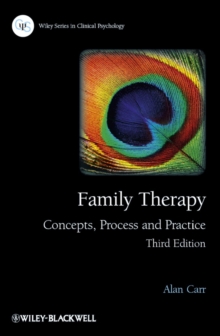
Cognitive Therapy for Chronic and Persistent Depression Paperback / softback
by Richard G. (Addenbrooke's Hospital, Cambridge) Moore, Anne (Nottingham Psychotherapy Unit) Garland
Part of the Wiley Series in Clinical Psychology series
Paperback / softback
Description
‘This volume provides the most comprehensive presentation to date of the phenomenology, clinical aspects and cognitive therapy of persistent depression.
The text is highly readable, replete with illustrative case material, and highlighted by concise summaries at the end of each chapter.
The treatment approach, already validated in the famed Cambridge–Newcastle clinical trial, is an invaluable contribution.’ Aaron T.
Beck, M.D. Drawing on extensive clinical experience, Richard G.
Moore and Anne Garland present a cognitive model of persistent depression that places particular importance on the role of thinking styles, underlying beliefs, subtle forms of avoidance and environmental factors. For the practitioner, this book offers guidance on how to address particular issues that commonly arise at each stage of therapy, such as: the patient is reluctant to engage in therapythe patient’s negative thinking does not respond to standard therapeutic techniquesthe patient’s negative beliefs have much basis in their experiencethe therapist becomes demoralised by the apparent lack of progress in therapy Through extensive clinical material, Cognitive Therapy for Chronic and Persistent Depression demonstrates how entrenched negative thinking patterns and ongoing avoidance can be addressed to achieve significant change in many people’s lives. This book is essential reading for any therapist working with these hard to help patients, such as clinical psychologists, psychiatric nurses, psychiatrists, social workers and counsellors.
Information
-
Available to Order - This title is available to order, with delivery expected within 2 weeks
- Format:Paperback / softback
- Pages:448 pages
- Publisher:John Wiley & Sons Inc
- Publication Date:19/08/2003
- Category:
- ISBN:9780471892793
Information
-
Available to Order - This title is available to order, with delivery expected within 2 weeks
- Format:Paperback / softback
- Pages:448 pages
- Publisher:John Wiley & Sons Inc
- Publication Date:19/08/2003
- Category:
- ISBN:9780471892793










